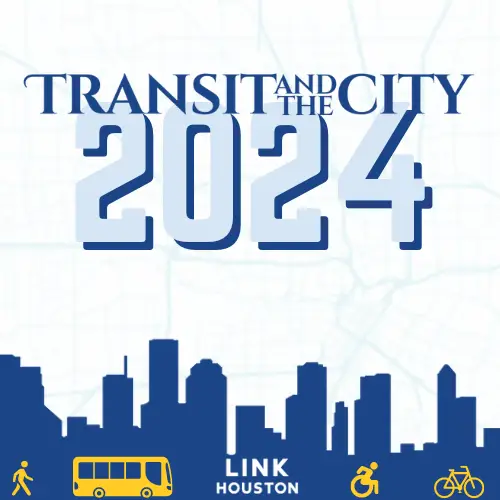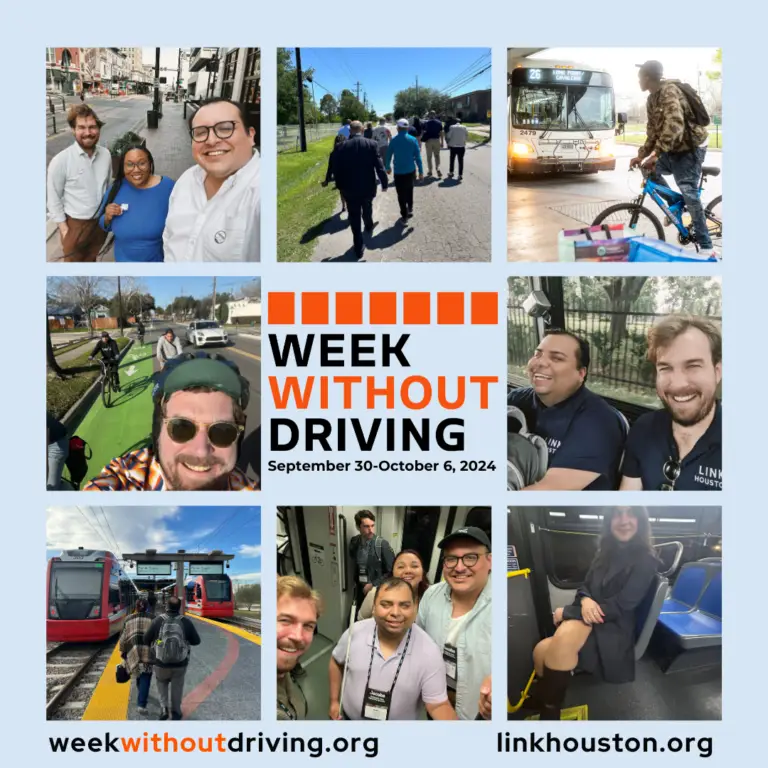Closing the Gaps: Addressing Houston’s Sidewalk Crisis
Get Involved!
The City of Houston collected feedback from residents through eight public meetings and at letstalkhouston.org through November 7.
The City of Houston held a public hearing for the proposed amendments on November 14 at Planning Commission.
Now, the proposed amendments will be reviewed and potentially approved through the following schedule:
The original dates of these meetings have been cancelled – stay tuned for an updated schedule.
- Planning Commission on TBD at City Hall Annex, 900 Bagby St, Houston, TX 77002
Sign up to speak by registering in person at the meeting. - City Council Quality of Life Committee on TBD at City Hall, 901 Bagby St, Houston, TX 77002
Sign up to speak by registering in person at the meeting. - City Council: public comments on TBD at City Hall, 901 Bagby St, Houston, TX 77002
Sign up to speak by emailing speakers@houstontx.gov by the Monday before at 3pm.
LINK Houston will host a virtual meeting of the Community Action Network to help you prepare your comments.
- Thursday, December 5 at 6pm
Sign up to attend the next CAN meeting at bit.ly/LINKCAN24
LINK Houston has prepared a toolkit to help you prepare your comments: bit.ly/LINKsidewalks
The Community Action Network is LINK Houston’s community of practice for capacity building, knowledge sharing, and collective action made up of Houstonians passionate about improving mobility in their communities.
The future of Houston’s sidewalks is in our hands. Join us to ensure that the city’s actions lead to real improvements for our communities. Your voice can help shape a safer, more walkable city for all Houstonians.
The Problem
According to City of Houston data:
- Only 57% of Houston streets have sidewalks at all.
- Of existing sidewalks, 39% are rated sub-par (37% fair + 2% poor).
- Even sidewalks rated “good” lack adequate curb ramps, safe crosswalks, and other elements required to be fully accessible for all users.
- With nearly half of Houston’s streets lacking sidewalks, and over a third of existing sidewalks in poor condition, walking and rolling in our city is not just inconvenient, it’s dangerous. This jeopardizes the safety of pedestrians, especially children, older adults, and people with disabilities.
The Need
The City of Houston estimates it would cost:
- $13.2 billion to provide sidewalks on both sides of every street that doesn’t have one, plus repair 75% of existing sidewalks.
- $7.2 billion to provide sidewalks on one side of every street that doesn’t have one, plus repair 50% of existing sidewalks.
How are sidewalks built in Houston?
- For decades, the City of Houston has put the responsibility on individual property owners to build and maintain sidewalks adjacent to their properties.
- When new buildings are constructed, the developer is generally required to build sidewalks.
- Since 2023, developers can opt-out of sidewalk construction by paying a “fee in lieu” to fund sidewalks elsewhere. However, none of these funds have been spent.
- Public agencies also play a role in sidewalks, although their jurisdiction is limited.
- Houston has only $3 million per year of dedicated sidewalk funding. Residents can request sidewalk improvements from the City if they meet certain criteria: near schools, along major thoroughfares, or routes documented to be used by people with disabilities. Only a fraction of eligible requests are approved.
- The City of Houston, Harris County, Tax Increment Reinvestment Zones (TIRZ), METRO, and the Texas Department of Transportation can include sidewalks in their infrastructure projects.
What is the City proposing?
After a compromise on sidewalks in 2023, the City of Houston is proposing further changes to the sidewalk ordinance.
The City’s stated goals are to:
- Provide a safe, comfortable, and accessible sidewalk network for all residents
- Simplify the ordinance to eliminate confusion and redundancy
- Streamline the application process for applicants and staff
- Expand the sidewalk construction exemption criteria
The proposed ordinance succeeds at Goals 2, 3 and 4, while failing at Goal 1. By allowing more developments to opt out of building or funding sidewalks – and without additional dedicated funding – the City’s sidewalk network will remain unacceptably poor.
What are the new exceptions?
For developers building single family homes, the proposed ordinance expands the exemption criteria from one to five. If developers meet these criteria, they will be exempt from building sidewalks or paying a fee. The new exceptions are below, along with LINK Houston’s thoughts on each.
- Deed restrictions prohibit sidewalks
Historically, deed restrictions have been an effective tool for preventing integration of neighborhoods. Also, deed restrictions only have legal authority over private property, not the public right-of-way. - Lot is 1 acre or larger
People still need safe sidewalk access in large lot neighborhoods. - No sidewalks on block face and across street (except near schools, libraries, community centers)
A much broader range of locations – bus stops, doctor’s offices, workplaces, places of worship, and more – need safe sidewalk access than these three criteria. - Ditches make sidewalks infeasible
The City of Houston completed the “Resilient Sidewalks Plan” in 2023 to develop feasible sidewalk designs for challenging locations, like streets with ditches.
For developers building any new construction, the proposed ordinance expands the exemption criteria from four to six. If developers meet these criteria, they will be exempt from building sidewalks or paying a fee. The new exceptions are below, along with LINK Houston’s thoughts on each.
- There is an existing obstruction to the sidewalk
The City of Houston completed the “Resilient Sidewalks Plan” in 2023 to develop feasible sidewalk designs for challenging locations, like around obstructions. - If approved by the sidewalk committee, for other reasons not specified by the ordinance
This exception is ambiguous and does not include any best practices to guide its implementation.
For properties that do not meet these criteria, developers may opt out of building sidewalks by paying a fee. However, the City estimates they will raise 66% less through the fee if these new exceptions are in place.
What do we really need?
Houston deserves a plan that will make meaningful progress towards addressing our sidewalk deficit. Sidewalks are essential for safe, accessible, vibrant communities. If the City of Houston is taking any action on sidewalks, the result should be a net improvement to the overall network of safe routes to walk and roll. The City must dedicate funding to address the sidewalk problem. Here are a few options that would make meaningful progress towards a complete sidewalk network.
- Bond: The City of Houston could ask voters to borrow money for sidewalk improvements. Austin has recently passed three bond referendums (in 2016, 2017, and 2018) funding a total of $1.34 billion in mobility improvements, including sidewalks.
- Fee: The City of Houston could institute a fee for some or all property owners to fund sidewalk improvements. Denver passed an annual fee of $150 in 2022 by ballot referendum.
- Grants: The City of Houston should seek more grants through state and federal programs. Houston recently won $43 million from the Reconnecting Communities program to fund complete sidewalk networks in Kashmere Gardens and Gulfton.
- Public-private partnerships and philanthropy.
- Other agencies like Harris County, METRO, or TxDOT should increase funding for sidewalk construction.
For more information, contact:
LINK Houston
info@linkhouston.org
(713) 353-4604






